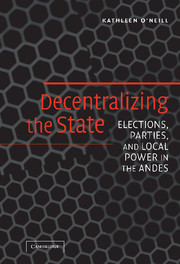4 - The Colombian Experience
Published online by Cambridge University Press: 02 December 2009
Summary
[I]t was evident, if you looked at the political map, that the Liberal party was a definite majority in the country so it seemed logical that the Conservatives in highly conservative regions gave a lot of support to the idea of decentralizing power. It is interesting to note that even in large cities with Liberal majorities, there are Conservative mayors due to the factioning of the Liberal party there.
Interview with Humberto de la Calle, Ministro de Gobierno, to César Gaviria (1990–1994)Introduction
Comparative studies of Latin American political economy often treat Colombia as an enigma or ignore it completely. In a region marked by political upheaval, Colombia plods quietly along without major military coups in the twentieth century, boasting a rather stable two-party system and the region's longest enduring constitution (1886–1991). In a region known for economic booms and busts, sharp fluctuations and hyperinflation, Colombia has generally enjoyed slow but steady growth and has long commanded an excellent credit rating for its debt repayment record. The country has been most often associated with its role in the illegal narcotics trade and the longest and largest guerrilla war on the continent, so studies of Colombia have often focused on the negative. Colombia's, major political problems are tempered with profound achievements, however. The fact that Colombia was one of the earliest countries in the region to adopt decentralization and one of the most diligent in extending it stands out as a true accomplishment.
- Type
- Chapter
- Information
- Decentralizing the StateElections, Parties, and Local Power in the Andes, pp. 89 - 123Publisher: Cambridge University PressPrint publication year: 2005



